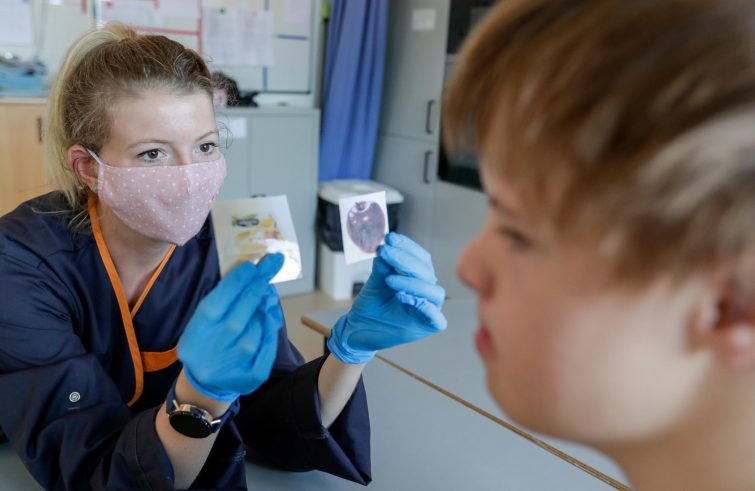
In 2019 over 28,000 people with autism spectrum disorders (ASD) – half of them 0-11 years old – have been treated in 14 Catholic healthcare centres registered in the non-profit sector. The figures are contained in a survey presented today, promoted by the National Office for the Pastoral Care of Health of the Italian Bishops’ Conference (CEI), entitled Diagnosis and Treatment Services, Pastoral Care and Family Support for People affected by Autism Spectrum Disorders (ASD), offered by Catholic and Christian-inspired health facilities. These health centres, operating in 52 branches throughout the country, are members of the Autism Panel established in 2019 by the aforementioned CEI Office. Massimo Angelelli, director of the Office, highlighted the “significant contribution to National Health, especially in addressing situations of fragility and continuity of care”, in the hope that these realities will not be “marginalized and forgotten”, nor “mistaken with profit-based healthcare.” Satisfaction was equally expressed by Stefano Vicari, director of the Child Neuropsychiatry Unit of the Children’s Hospital Bambino Gesù in Rome and scientific referent of the CEI Panel, who explained to SIR:
“We would like to see increased recognition from the NHS, but what’s important is that we surveyed a reality of hitherto unimaginable proportions.”
“We contacted the Catholic-inspired autism clinics where we found not only excellent international centres of excellence – five IRCCS, Scientific Institute for Research, Hospitalization and Healthcare- (including the Bambino Gesù Hospital, ed.’s note) – but also centres that provide highly qualified care and treatment at local level.” The Panel’s representative further stressed that 28,000 patients are “a huge number”, highlighting the fact that diagnostic procedures and treatment protocols adopted by the surveyed centres should be recognized “as a Golden Standard at an international level, offering the best possible approach to autism.” “We will now return this material not only to the families”, he said, “but also to those with governmental responsibilities in order to raise awareness and give practical evidence that
the network we are creating offers an extremely qualified service in Italy, operating according to certified guidelines, which can serve as a valuable partner for improving the quality of care of people with autism disorders.”
 For the neuropsychiatrist the spotlight should be on “an underestimated and poorly considered problem, as demonstrated by the lockdown that for people with autism has meant a suspension, i.e. virtually zero treatment. This dramatic situation was further aggravated by the failure to reopen schools.” Hence a provocative question:
For the neuropsychiatrist the spotlight should be on “an underestimated and poorly considered problem, as demonstrated by the lockdown that for people with autism has meant a suspension, i.e. virtually zero treatment. This dramatic situation was further aggravated by the failure to reopen schools.” Hence a provocative question:
“What country is the one that is worried about resuming the football league but not about reopening schools? It’s a country that hardly invests in its own future.”
Yet schools are fundamental as they represent “an educational institution offering these children the opportunity to experience quality relationships with their peers outside the family environment.” With regard to treatment, the expert explained that they vary according to developmental stages. In the 0-6 year-old age bracket, “intensive behavioural” treatments and parent-mediated therapy are particularly effective, while “specific diets or psychoanalytic treatments are utterly useless”, he said alerting parents, who are often alone in choosing between a range of suggested therapies. It is therefore important to contact only those centres that “follow scientifically evidence-based guidelines”, such as those of the CEI survey. Treatments differ with older children and adolescents: “each stage of development requires a targeted approach. All surveyed clinics provide a customized approach to treatment according to individual need.”
Also families… were severely affected by the lockdown. “Parents of autistic children, especially those with severe disorders, face a very demanding commitment.” For this reason, the whole family is cared for in addition to the patient, “but this conflicts with health system regulations. While the legislator failed to address the problem of how to continue treatment during the quarantine, many clinicians continued, on their own initiative, via computers and tablets to ‘accompany’ and support the parents, although not all regions provide remuneration for this activity left mostly to individual goodwill and responsibility.” And yet,
“this lack of direction at national level negates the right to treatment, i.e. health, of particularly vulnerable people.” Moreover, at the age of 18, “they seem to vanish into thin air.
Very few centres treat adult autistic patients; fortunately, our survey shows that several of the centres surveyed do so.”
ASDs represent the most frequent form of disability in the developmental age affecting approximately 2% of the overall population. For this reason, the expert said,
“there is an urgent need for coordinated and increasingly scientifically evidence-based approach.
The data presented today could inspire government leadership to demonstrate that this is not science fiction. We are there for public health decision-makers, hoping that we will not continue to be ignored.” He concluded:
“We no longer want to be defined as service providers because this is not about contracting out specific rehabilitation activities, but about proposing a comprehensive lifelong project that always puts the human person at the centre.”











